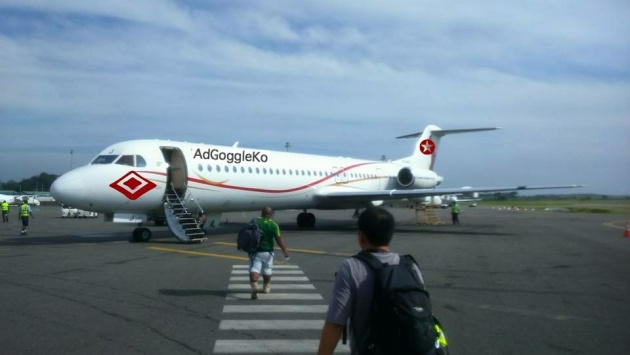I am currently on a short vacation in Manila, the premier city of my beloved Philippines.


I am back on the asphalt or concrete jungle where I started my career in the field of AVIATION. I am staying in the home of a good friend and long time co-worker (Aircraft Mechanic) and his graceful and lovely wife and kids. Being an Aircraft Mechanic, I saw him rise from the ranks. Now, he is a very successful Aircraft Mechanic working overseas with a lot of green bucks to spare.

When he started as a Junior Mechanic with our former company, he just had barely enough pay to cope with his daily subsistence as a bachelor. But because of hardwork, perseverance and good skills, he was able to land a job with a local airline, got married and is currently working with an aviation firm abroad.
Success stories like this is a time machine that takes me back to where I started my career path.

During those times, I remember how closely knit we all were in our aviation company. We were just like one big happy family sharing our dreams and aspirations together after work. Yes, we worked hard, played hard, laughed and cried together. And, we learned a lot from our bosses!


Quite recently, I had a chance to re-unite with my co-employees and my aviation buddies. I was so surprised how many of them are now successful and stable aviation professionals in their own right. In that gathering, my thoughts raced trying to catch up with the aviation talk I was once very familiar with.





Like in a flashback, we started talking about bird strike on high or low altitude flying aircraft and how they can prove dangerous and disastrous in some cases.

Imagine birds and high flying geese smashing into engines or windshields of jet airliners traveling at tremendous speed. Then we talked about losing CABIN PRESSURIZATION at 30 thousand feet above sea level should a bird strike break through an airliner's windshield. That force can suck the Pilots out of their seat and have fatal consequences. There was a documentary film we saw of such actual event, except that the Flight Engineer was able to hold on to the Captain who was almost sucked out of his plane.






My Aircraft Mechanic buddies showed me photos of engine ingestion due to bird strike. I distinctly remember years back when my aunt told us of her delayed flight back home due to "birds hitting their plane" on flight. At that time, I didn't believe her story. I was thinking no way can birds fly at aircraft altitudes. When I got into aviation, I found out migrating birds like wild geese or ducks do reach aircraft flight levels indeed.
Bird strikes can also occur during take-off while ascending at tremendous speed. This is a very critical moment for the Pilots. Or, while cruising at high altitudes. Or, during its final stage of rapid descent prior to landing.
In major airports around the world, bird strikes prevention are undertaken by Flight Safety personnel. While many countries observe policies on the protection of birds and wildlife, special means are employed to drive away birds that may post hazardous situations for inbound and outbound aircraft. Around the aerodrome and runways it is common to see smaller birds like pigeons, swallows, robins, sparrows and several species of migratory birds like egrets and seagulls. Some methods used to drive away these birds are the use of loud pyrotechnic devices, loud speakers or for hardheaded pesky birds, shotguns. Some use trained falcons to chase and disperse these birds.
During the olden times when aircraft were slow and low flying, bird strike cases were not that severe. In this day and age of ultra sonic flight, bird strikes can endanger the lives of passengers and crew. It can also result to very expensive repairs on aircraft engines and airframe.

Small aircraft like Piper Cubs, Cessna's or even helicopters rarely if at all encounter bird strikes while on flight. WHY? Because they are slow and low flying.
Large birds like migratory geese can fly up to 20 thousand feet. And because of their size and weight they can cause serious damage to fast approaching jet aircraft.

Helicopters in particular, normally flies and cruise from up to 1 or 2 thousand feet at most on routine and short range flights. Their big and noisy rotor blades and engines can be heard from afar giving much time for the birds to avoid them. Same goes for the Pilots of course. With a good 180 degrees visibility from their cockpit, they can spot and avoid colliding with birds.
Yes, I am not discounting the fact that there may be extreme cases of helicopter bird strikes though. I read sometime ago of a helicopter bird strike that happened in Norfolk, Virginia USA. But like I said, the odds may be a hundred to one. There are about more than a hundred helicopters of different types currently flying in the Philippines, and I still have to hear about such collision.
If ever a birdstrike occurs on a helicopter, I suppose damage may produce superficial dents on the nose portion or a cracked or smashed windshield at the most. Should this happen, the Pilot will still be able to continue his flight and land his helicopter safely.

Unlike high flying jet airliners, helicopter cabins are NOT pressurized and its passengers won't feel the horrifying effects of cabin decompression at an altitude of 20 or 30 thousand feet. Yes, a bird strike on chopper may be quite scary but remember the beauty of a helicopter is that it can land on any obstruction free area in case of any emergency. And also unlike big jet aircraft, helicopters have smaller engine intakes which are protected by a strong mesh from foreign object damage.
Bird strikes which are common on airliner engines are a very costly propositions. Bird ingestion of helicopter engines are highly remote.
Of course, we talked about how life is treating them now compared to what we were before. I am so happy that they are all making good in life. I don't think I would be in their shoes now. I am not a highly skilled and technical person like them.
Am happy where I am now -- CAREFREE and EASY GOING. I am single and not much to worry about tomorrow. I really miss aviation life though.



I can't help but reminisce the days my office mates and I would enjoy the yearly HOT AIR BALLOON festivals. Such an AWESOME EXPERIENCE!

My Personal Blog: https://yvonnenovela.wordpress.com



